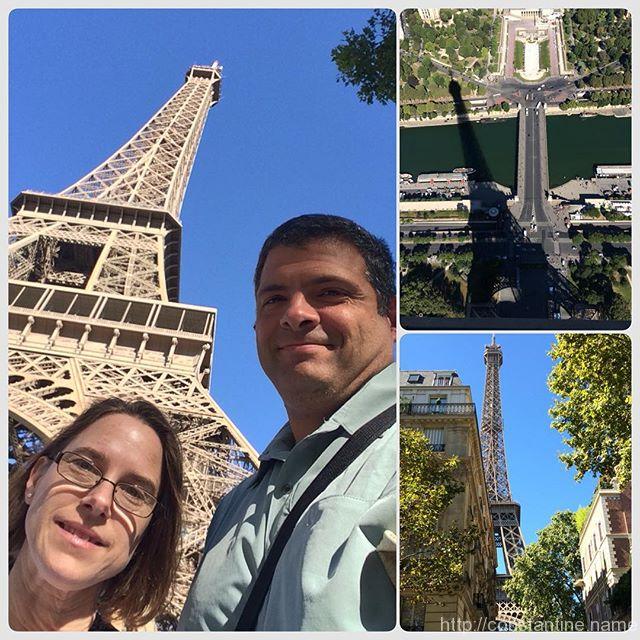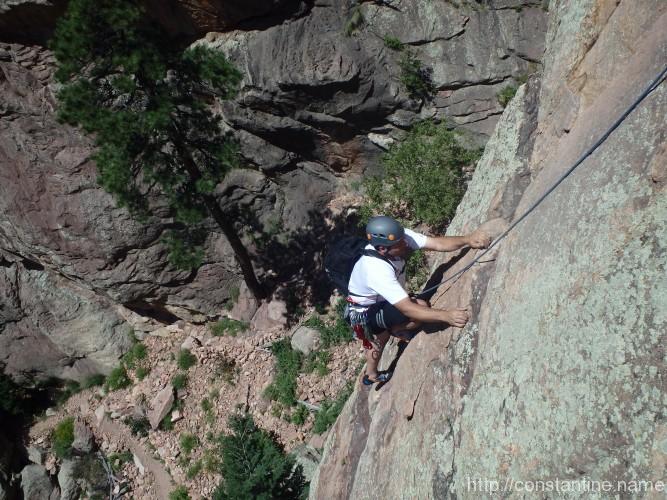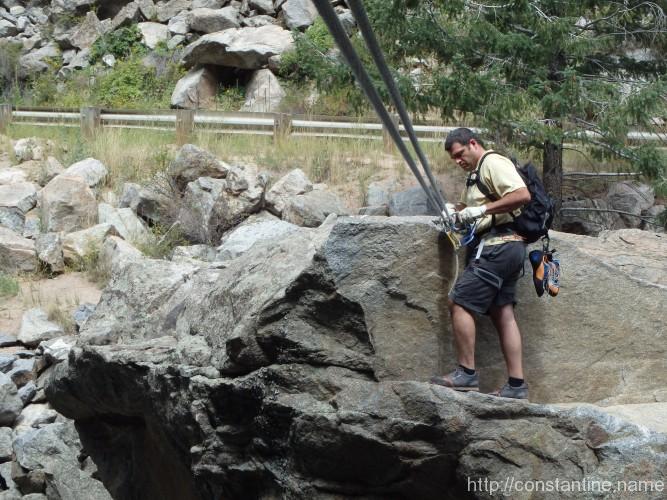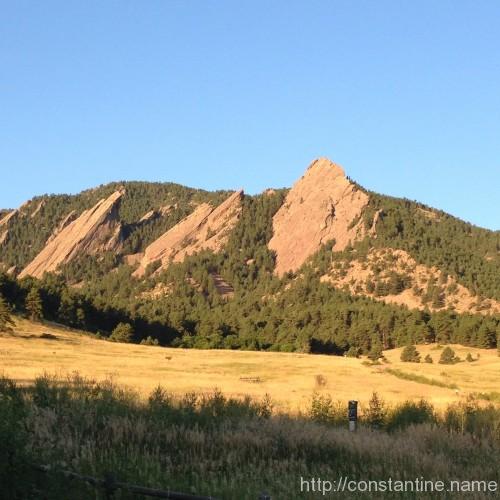If you only read the books that everyone else is reading, you can only think what everyone else is thinking.
~ Haruki Murakami
slip:4a1463.
If you only read the books that everyone else is reading, you can only think what everyone else is thinking.
~ Haruki Murakami
slip:4a1463.
There is no piece of straw incapable of breaking the camel’s back. Because there’s nothing particularly interesting about the final piece of straw, it’s the total mass. Over the past week I’ve been attacking my lists in a sort of upside down fashion. There are some big, low-priority things sitting at the bottom of my lists for some time. They’ve resisted my finely-honed urge to summarily delete them; each time I consider them I remain sure I want to actually do them. None the less, I see them and I know they’re there and they weigh upon my mind.
Left unchecked, every life flows away from higher aims and towards the path of least resistance. Daily practices can help stem this slide. But staying on course requires check-ins that are too big to do every day, and too important to only accomplish monthly (or yearly).
~ Brett McKay from, «https://www.artofmanliness.com/character/habits/sunday-firesides-theres-only-so-far-you-can-get-off-track-in-a-week/»
slip:4uaoca18.
Last weekend, as I often do, I did a review and decided to focus on those big, low-priority items. And to my surprise, I’ve been springing out of bed at 530—the normally targeted time, but which is often a struggle—and smashing these items in multi-hour dashes. Crossing them off one by one has been sublime. The magic seems to be the combination of going to bed knowing I’m going to start tomorrow working on those things which are actually on my mind, and knowing that I’ve set myself a specific window of days to smash this stuff.
ɕ
We live in a world where we have to hide to make love, while violence is practiced in broad daylight.
~ John Lennon
slip:4a1248.
Not to accept your mistakes is to increase them.
~ Leo Tolstoy
slip:4a986.
What does it mean – “having a practice”? It is a very vague definition that can be used in many ways and can mean many things. As well as it can mean nothing at all, just referring to smoke and mirrors. The straightforward notion of “practice” in itself entails being involved in a process, repeatedly engaging in an activity with the end goal of achieving mastery in something. It can be both an empty description of a habit or it can be a phenomenon that fills human life with meaning.
~ Anna Bezuglova from, The Bamboo Body – Blog – Movement Practice Barcelona
slip:4utebo4.
I’ve often mentioned the power of asking movement enthusiasts for, “three words to describe your practice?” The power of my question comes both from the difficulty in summarizing and from the difficulty in describing one’s practice. And yes, I’ve made a note to see if I can get around to talking with Bezuglova on the Movers Mindset podcast.
ɕ
How can someone with no technical expertise successfully create and sustain a podcast while navigating challenges and leveraging teamwork?
Hear the story of a podcast journey that started with a simple Facebook post and evolved into a partnership with a professional network.
What is your why? […] because I’m doing this because I want to talk about the taboo things around relationships and sex and love and [simply because] I want to? That’s my message and that’s why I want to make a normal conversation.
~ Elizabeth Cunningham (21:37)
The conversation explores how Elizabeth navigates the world of podcasting without a technical background. She shares her experiences of starting with zero tech knowledge and seeking help from friends and professionals along the way. Through simple actions like posting on Facebook and asking for guidance, she built a podcast with over 60 episodes, proving that technical expertise is not a prerequisite for success. The discussion highlights the importance of focusing on the message and reaching out for support when needed.
Another key theme is the significance of taking action despite uncertainty. Elizabeth reflects on how her regrets were always tied to inaction, while her successes stemmed from simply trying, even when the outcome was unclear. The conversation also touches on the benefits of forming a team and the synergy that arises when working collaboratively, as well as the value of starting small, mastering one thing, and building from there. These lessons apply not just to podcasting but to any creative or professional endeavor.
Takeaways
Starting without technical expertise — Emphasizing that podcasting can begin with little or no tech skills by focusing on the basics and seeking help.
Value of action — Highlighting how taking action, even in uncertainty, leads to growth and learning.
Building a supportive network — Stressing the importance of reaching out to others and asking for help, especially when starting something new.
Team collaboration — Discussing how forming a team can create synergy and improve creative outcomes.
Adapting to challenges — Sharing examples of how challenges like COVID-19 were met with adaptability and new approaches.
Focusing on the “why” — Exploring the need to understand and align actions with a clear purpose or mission.
Starting small — Encouraging listeners to focus on mastering one platform or skill before expanding further.
Overcoming mindset blocks — Addressing how mindset issues can hinder progress and providing ways to move forward.
Resources
Elizabeth Cunningham @elzcunningham
Love Dripping From the Walls Podcast — Elizabeth’s podcast discussing love, sex, and relationships.
(Written with help from Chat-GPT.)
ɕ
At the mid-point of the path through life, I found myself lost in a wood so dark, the way ahead was blotted out. The keening sound I still make shows how hard it is to say how harsh and bitter that place felt to me —
~ Dante
slip:4a381.
Socrates knew how a rational soul is moved; that it is like a balance, and if a weight is thrown in the scale, it will incline whether you wish it or not. Show the rational governing faculty a contradiction, and it will renounce it; but if you fail to do so, blame yourself rather than the person whom you are unable to convince.
~ Epictetus
slip:4a333.
Most of us are content to live in a world where time is simply what a clock reads. The interdisciplinary artist Alicia Eggert is not. Through co-opting clocks and forms of commercial signage (billboards, neon signs, inflatable nylon of the kind that animates the air dancers in the parking lots of auto dealerships), Eggert makes conceptual art that invites us to experience the dimensions of time through the language we use to talk about it.
~ Ahmed Kabil from, How Long is Now? – Long Now
slip:4uloho1.
Thinking about the nature of time always feels like trying to find the other edge of the Mobius strip. At first, I’m mildly excited to be reminded of such a simple thing. It’s such an interesting thing to think about. I go around and around trying to grasp different time scales, and the entire expanse of time. But soon I realize that I’m really only thinking in circles. Is there a takeaway beyond, “being mindful is good”?
Or does simply performing the awareness of time and the circular thinking, somehow reset—or recenter, or realign?—my thinking? Reset my thinking in the same way that one resets the drum-brakes on your car, by backing-up and then braking firmly causes the drum brakes to adjust their grip on the brake cable.
Also, see other branching from when.
ɕ
Your freedom will not come from trying to ignore all the “stuff” or by trying to complete everything—it requires truly detaching from it.
~ David Allen from, GTD and stress – Getting Things Done®
slip:4ugega2.
Detaching from all the stuff is a linchpin behavior for me. Wherever I go, there I find myself; if I want to not be swept away by all the stuff on my mind I have found exactly four things which work:
I really hope you have no idea what I’m talking about here. If you do, I offer my sincere condolences.
ɕ
Our deepest fear is not that we are inadequate. Our deepest fear is that we are powerful beyond measure. It is our light, not our darkness that most frightens us. We ask ourselves, ‘Who am I to be brilliant, gorgeous, talented, fabulous?’ Actually, who are you not to be?
~ Marianne Williamson
slip:4a544.
Courage is resistance to fear, mastery of fear — not absense of fear.
~ Mark Twain
slip:4a82.

Helping bolt this loooong wall to the concrete floor. Take a moment to look closely at how large this space is. There is a person in this photo. #100days #artdudeplacement
ɕ
A man of words and not of deeds, is like a garden full of weeds.
~ Ben Franklin
slip:4a543.

This lady seems familiar…
ɕ

If you’re going to be tourists, I say go ‘all in’. Not crowded at all, zipped right in. Still breezy and cool this morning!
ɕ

Notre Dame at dawn!
ɕ

Photos from our ascent of the Wind Ridge (5.6) route on the Wind Tower in Eldorado Canyon.
The canyon is an indescribable mecca of climbing, with classic routes just criss-crossed all over the canyon walls. We selected Wind Ridge because a) I could climb it and b) it was a short three pitches with easy access to water for our ALS ice water challenge.
ɕ

This had my name written all over it. (“Craig” means “dweller of the crag”.)
After climbing the first Flatiron, we only got a few hours of nap time. After some shopping, (new climbing shoes!) we heading into Boulder Canyon to climb on some granite in a “sport climbing” setup – meaning the rock had countless rock bolts set making it super easy to setup the fall protection.
Turned out I was so burnt from the previous day, I could only do a couple small sections. On the up side, I got to spend a lot of time belaying Mike while he worked on some project routes.
Getting to the climb involved a short walk down the road, traversing the roaring creek on a tyrolean traverse and a short walk back up the other side. Seriously fun!
ɕ

Sunday evening, on a whim, we decided to tackle the first flatiron. (My details on the climb are in my Flatiron #1 post.)
ɕ

A gallery of a few photos from my first hike in Colorado. I arrived late in the evening on Saturday, and this was my first exertion to see how the altitude really felt. Great little hike up a couple hundred feet.
ɕ

Objects in mirror are closer than they appear.
ɕ
“With the publication of Fahrenheit 451, you were hailed as a visionary. What would you warn us about today? Our education system has gone to hell. It’s my idea from now on to stop spending money educating children who are sixteen years old. We should put all that money down into kindergarten. Young children have to be taught how to read and write.”
From the Spring 2010 issue of the Paris Review:
slip:4uteie12.
INTERVIEWER
With the publication of Fahrenheit 451 , you were hailed as a visionary. What would you warn us about today?BRADBURY
Our education system has gone to hell. It’s my idea from now on to stop spending money educating children who are sixteen years old. We should put all that money down into kindergarten. Young children have to be taught how to read and write. If children went into the first grade knowing how to read and write, we’d be set for the future, wouldn’t we? We must not let them go into the fourth and fifth grades not knowing how to read. So we must put out books with educational pictures, or use comics to teach children how to read. When I was five years old, my aunt gave me a copy of a book of wonderful fairy tales called Once Upon a Time , and the first fairy tale in the book is “Beauty and the Beast.” That one story taught me how to read and write because I looked at the picture of that beautiful beast, but I so desperately wanted to read about him too. By the time I was six years old, I had learned how to read and write.We should forget about teaching children mathematics. They’re not going to use it ever in their lives. Give them simple arithmetic—one plus one is two, and how to divide, and how to subtract. Those are simple things that can be taught quickly. But no mathematics because they are never going to use it, never in their lives, unless they are going to be scientists, and then they can simply learn it later. My brother, for example, didn’t do well in school, but when he was in his twenties, he needed a job with the Bureau of Power and Light. He got a book about mathematics and electricity and he read it and educated himself and got the job. If you are bright, you will learn how to educate yourself with mathematics if you need it. But the average child never will. So it must be reading and writing. Those are the important things. And by the time children are six, they are completely educated and then they can educate themselves. The library will be the place where they grow up.
What if there was a way for parents to obtain age-appropriate reading material for their children at a very affordable cost?
Suppose we nationally produced different series of books — picture books, alphabet books, then word books, early readers etc. Certainly, it would be difficult to decide at a national level what should be in the books, but common ground could be reached. Our existing elementary educators would know what would best merge with our education systems already in place. We’d have a massive economy of scale producing these materials, and they could be distributed through the schools.
This seems like it wins in several ways: Easier for the parents, more children exposed to reading and exposed sooner, and more parent involvement with their child’s education. Furthermore, the private sector could produce side tracks (which would be available through retail, not through the schools); This would be similar material but perhaps in additional languages; Or there could be cultural and heritage specific tracks that parents could purchase if they wish.
ɕ